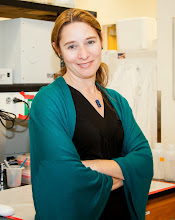I was listening to NPR the other day (no shock there - I am a scientist). The radio host had a number of guest experts on genetically modified food - both plants and animals - and was attempting to engage the experts in a spirited discussion of the pros and cons of having transgenic organisms in the human food chain. I say “attempting”, because the experts were doing what we scientists so often do - talking science.
I’m a biologist, and I’ve created transgenic animals (although I’ve never tried to eat my green-glowing zebrafish!). I had to concentrate hard to figure out what the scientists on NPR were talking about. I can’t imagine what the listening experience was like for a member of the public - they would probably just change the channel. Why is it that we scientists find it so hard to talk like normal people?
Marine biologist, author, and movie director Randy Olson addresses this issue in his book, “Don’t be Such a Scientist”, where he encourages us to drop the science-speak and just talk to people. It’s not so easy -we’re conditioned from a young and impressionable (grad student) age to use big words and to sound impressive. And it’s true that often those big words are more precise, convey more nuance, than everyday words, and that those big scientific words are appropriate when talking to our colleagues.
Problem is, I think we get so used to talking this way that it’s hard to shift our thinking and our word choice when we attempt to engage the lay public. The bigger problem, though, emerges when we only talk like scientists - that same lay public tunes us out, changes the channel, and misses important scientific findings that can have a real impact on their daily lives…like genetically modified organisms bred for human consumption.
I end this post with a pledge, say it with me now, “I will attempt to truly communicate with the 99.99% of the planet that doesn’t have a scientific degree.” OK, so I made that figure up, but you get the idea. In future posts we’ll look at how to actually uphold this pledge, covering topics like composing an elevator (or happy hour!) speech, delivering our presentations with (gasp) genuine enthusiasm, and the ins and outs of a good Q&A session, both as the speaker and the questioner. Stay tuned!
This post was first published at AAAS MemberCentral.
Speaking about Science...the blog about how to communicate scientific concepts to the public, and to other scientists, and about why we should care.
About Me

- Allison Coffin, PhD, DTM
- I'm an assistant professor of neuroscience at Washington State University in Vancouver, where I use tiny zebrafish (the size of an eyelash!) as a model system to study human hearing loss and how we can prevent it. I'm also a long-time Toastmaster and I teach communication workshops. This blog represents the merging of my two passions - science and communication, which has really become one central passion - the science of communication. There's a revolution in science right now...the idea that we scientists should sometimes leave the lab and talk about what we do, and why we do it, to real people. This blog looks at why we should do this, and how to actually talk about science with non-scientists (and with each other!). Portions of this blog are also featured on Qualia, the AAAS MemberCenter blog site.
No comments:
Post a Comment